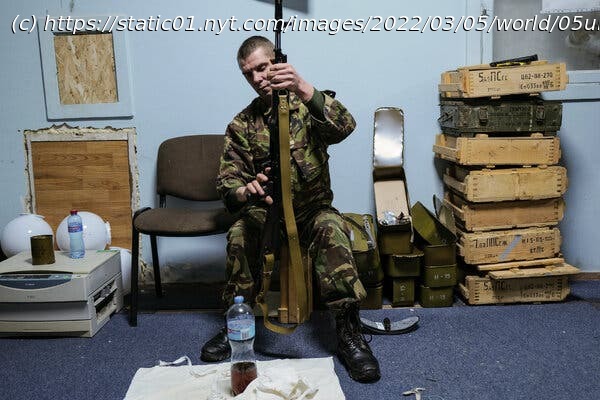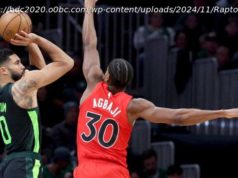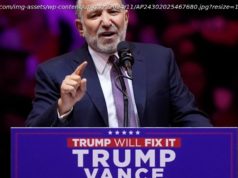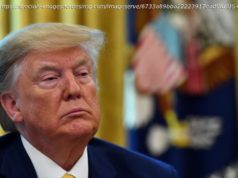Kyiv March 6, 1:41 a.m.
Moscow March 6, 2:41 a.m.
Washington March 5, 6:41 p.m.
The Russian leader escalated …
Kyiv March 6, 1:41 a.m. Moscow March 6, 2:41 a.m. Washington March 5, 6:41 p.m. The Russian leader escalated his threats as Ukrainian forces continued to resist. Protests broke out in the first major city captured by Russia. A limited cease-fire collapsed in a besieged city. Israel’s prime minister visits Moscow. Marc Santora As his troops continued to run into stiff resistance in Ukraine, President Vladimir V. Putin of Russia delivered an ominous message to Ukrainians on Saturday, telling government leaders they might lose their statehood and likening the withering sanctions imposed on his country to a “declaration of war.” “The current leadership needs to understand that if they continue doing what they are doing, they risk the future of Ukrainian statehood,” Mr. Putin said. He also said any third-party countries that tried to impose a no-fly zone over Ukraine would be considered enemy combatants. Ukraine’s president, Volodymyr Zelensky, has beseeched Western countries to declare such a no-fly zone. Mr. Putin issued his threats as Ukrainians across the country continued to engage in defiant displays of patriotism, even in places that have been overtaken by the Russians. In Kherson, the first major city to fall to Russian troops, hundreds of protesters gathered in the central square at 10 a.m. on Saturday, many waving Ukrainian flags, according to video streamed live from the scene and verified by The New York Times. The besieged coastal city of Mariupol in southern Ukraine halted a planned evacuation on Saturday, accusing Russian forces of shelling the city and violating a temporary cease-fire that city administrators wanted to use to get citizens out. Here are the latest developments: Russia’s military is trying to add to its gains in the south, moving closer to the vital port city of Odessa, as it tries to cut off the Ukrainian government from the sea. Outside Kyiv, there have been fierce attacks and counterattacks as Ukrainian forces battle to keep the Russians from encircling it. The vast armed convoy approaching Kyiv from the north still seems to be largely stalled, according to Western analysts, and the Ukrainian military says its forces have been attacking it where they can. Prime Minister Naftali Bennett of Israel traveled to Moscow to meet with Mr. Putin, according to Israeli and Russian officials. Mr. Bennett’s office said in a statement that the meeting lasted about three hours and took place “in coordination and with the blessing of the U.S. administration.” There was no immediate information about any outcome from the meeting. Since Russian forces surrounded Mariupol this week, the city has been facing a growing humanitarian crisis. It is largely impossible to bring in medical supplies and other relief. Despite daily bombardments, the local government has refused to surrender. NATO members are rushing to resupply the Ukrainians with Javelin and Stinger missiles and other weapons. American shipments represent the largest single authorized transfer of arms from U.S. military warehouses to another country, according to a Pentagon official. Azi Paybarah Mastercard and Visa said they would suspend operations in Russia, essentially severing cardholders there from transactions outside the country in response to the invasion of Ukraine. The suspensions announced on Saturday evening will prevent Mastercards and Visa cards issued by Russian banks from working in other countries and block people with cards issued elsewhere from purchasing goods and services from companies in Russia. But other transactions may still go through. Cards branded with the Mastercard or Visa logo that were issued by Russian banks may still work inside the country, because the transactions are handled by a local processor, officials at both companies said. In a statement, Mastercard — which has operated in Russia for more than 25 years — said it had not made the decision lightly. “As we take this step, we join with so many others in hoping for and committing to a more positive, productive and peaceful future for us all,” the company said. Visa said it planned to “cease” all Visa transactions within Russia “in the coming days.” A spokesman for the company said those transactions should be cut off within a week. Al Kelly, chairman and chief executive officer of Visa Inc., said in a statement: “This war and the ongoing threat to peace and stability demand we respond in line with our values.” Stanley Reed Shell, Europe’s largest oil company, said Saturday that it would probably continue to buy Russian crude oil to feed into its refineries and supply customers with gasoline and diesel but would donate any profits to a fund dedicated to “the people of Ukraine.” Shell had said on Monday that it was pulling out of operations in Russia. It issued a statement on its oil purchases on Saturday, a day after an article in the Financial Times revealed that the company had bought a cargo of Russian crude oil. Shell said in the statement that it understood that governments wanted energy flows to continue from Russia for the time being. The company described the purchase of the oil as “a difficult decision” taken to “avoid disruptions to market supply.” It went on, “Without an uninterrupted supply of crude oil to refineries, the energy industry cannot assure continued provision of essential products to people across Europe in the weeks ahead.” Russia is one of the world’s largest oil exporters, and many refineries, especially in Europe, are probably configured for processing some Russian crude. “Cargoes from alternative sources would not have arrived in time” to avoid interruptions in supply, the company added. The imbroglio shows the difficulty that oil companies and governments are having in calibrating their response to the invasion of Ukraine. Governments have been trying to impose sanctions on the Russian economy without disrupting flows of oil and natural gas. The idea is to punish Russia without inflicting pain on consumers in Europe, which is highly dependent on both Russian natural gas and oil, and the United States. Achieving these goals will probably prove difficult. Already, most buyers are shunning Russian oil, which is selling at a substantial discount. Shell announced on Monday that it would pull out of joint ventures with Gazprom, the Russian natural gas monopoly, including a liquefied natural gas facility on Sakhalin Island in Russia’s Far East. Shell also said that it would end its involvement with the Nordstream 2 natural gas pipeline from Russia to Germany, a project that has been completed but was blocked. Those moves, which will take time to be fully carried out, may not be sufficient to satisfy public opinion. Shell said that it would buy alternatives to Russian crude when possible, but completely dropping Russian oil could not happen overnight. It ended its statement on Saturday by saying it would work with aid groups and humanitarian organizations to determine where best to put the money from its Russian oil fund “to alleviate the terrible consequences that this war is having on the people of Ukraine.” Alan Rappeport The International Monetary Fund warned on Saturday that the war in Ukraine could inflict significant damage on the global economy, disrupting markets and trade and adding to inflationary pressures. The warning came as Russia’s invasion of Ukraine continued to escalate. The United States and European allies have imposed sanctions on major Russian financial institutions, its central bank and oligarchs, severing much of its economy from the rest of the world. “The ongoing war and associated sanctions will also have a severe impact on the global economy,” the monetary fund said in a statement on Saturday. The fund’s executive board convened for a meeting on Friday that was led by Kristalina Georgieva, the managing director of the fund, to assess the economic impact of the war. The board is expected to meet again next week to consider a request from Ukraine for $1.4 billion of emergency financing. The war presents a new round of economic challenges for a global economy that is emerging from the coronavirus pandemic and grappling with disrupted supply chains and high levels of inflation. “In many countries, the crisis is creating an adverse shock to both inflation and activity, amid already elevated price pressures,” the monetary fund said. The fund noted that Ukraine had already faced enormous damage to its physical infrastructure and that asset prices in Russia, including the value of the ruble, were down sharply as a result of sanctions. Countries with close economic ties to Russia and Ukraine could feel the effects of the tumult, the fund said. The World Bank is also working to deploy economic assistance to Ukraine, and David Malpass, the bank’s president, spoke to the country’s president, Volodymyr Zelensky, on Friday. Mr. Malpass said he was submitting a request to the bank’s board for a $500 million supplemental loan to help support Ukraine’s economy. Evan Hill and Alexander Cardia Videos verified by The New York Times appear to show Russian-backed separatists in a small town in eastern Ukraine firing on protesters, striking one in the leg. The shooting occurred around 1 p.m. Saturday outside a law enforcement building in Novopskov, north of Luhansk and near the Russian border, according to a witness and a Times analysis of the videos. In one video, as the protesters chant “Ukraine, Ukraine,” a shot can be heard, and a man at the front of the crowd falls down clutching his leg. He is helped away by other protesters. The regional governor wrote on Facebook that three people had been wounded in the shooting and were in the hospital. The soldiers in the video appear to be Russian-backed separatists from the self-declared enclave known as Luhansk People’s Republic, which claims the region. They are wearing helmets that look similar to those worn by other separatist forces, and are not wearing the uniforms or insignia of Russian troops. “Do you have any miners among you from the L.P.R.,” one protester asks the soldiers, referring to the region’s coal miners. The video of the shooting was first geolocated by an open source researcher on Twitter. The shooting occurred at the same location where a crowd gathered to protest on Friday. “War and death are coming for you,” those protesters yelled at the soldiers. “Get dressed and leave.” Olga Dzyurak contributed translation. Catherine Porter, Maciek Nabrdalik and Ivor Prickett For The New York Times The crush of Ukrainian women and children fleeing their country has already set a new European record since the end of World War II. And, as Russian attacks intensified on Saturday, it grew even bigger. On Saturday, the Polish city of Przemysl, a 20-minute drive from the Ukrainian border, was transformed into a hub for exhausted refugees pouring out of their country, with their children and pets in their arms. Many were planning trips further into Europe. Meanwhile, the train station in Ukraine’s western city of Lviv was choked with worried travelers, both arriving from besieged areas and desperately trying to flee the country. Click on each photo for more information. Julie Creswell While technology giants like Apple and luxury retailers like Hermès have quickly moved to pause sales or shutter stores in Russia over the invasion of Ukraine, most U.S. food companies and fast-food chains have remained open — and largely silent. Many large food manufacturers, including PepsiCo and Coca-Cola, and fast-food chains like McDonald’s and Yum Brands are facing growing pressure on social media platforms and from large investors to halt operations in Russia. Companies “need to consider whether doing business in Russia is worth the risk during this extraordinarily volatile time,” the chief of one big investor, New York state’s pension fund, said on Thursday. McDonald’s, Coca-Cola, PepsiCo and Mondelez International, the maker of Oreos and Ritz Crackers, did not respond to messages seeking comment about their operations in Russia. Starbucks and Yum Brands, whose chains include KFC and Pizza Hut, have said in response to the invasion that they were supporting humanitarian relief efforts. But unlike the retailers who have announced that they’re pausing operations in Russia, some fast-food companies do not actually own the restaurants that operate there under their names. In Russia, Starbucks, Papa John’s and Yum Brands chains including KFC and Pizza Hut are mostly run by franchisees, who often have close ties to Russian banks or investors. Franchise experts say that, depending on the agreements, it is probably up to the franchise owner to decide whether to close a restaurant because of political turmoil, rather than the brands themselves. Fast-food restaurants and food and beverage companies were some of the earliest entrants into the Russian market, and many have nimbly operated there for decades. Even during other times of political turmoil and tensions, the companies still found consumers eager to buy American soda and gobble up burgers, chicken and pizza. When McDonald’s opened its first restaurant in Russia — in Moscow’s Pushkin Square in 1990 — an estimated 30,000 Russians lined up to sample its hamburgers for the first time. A few years later, Mikhail Gorbachev, the former leader of the Soviet Union, appeared in a commercial for Pizza Hut. Unlike other chains, McDonald’s owns the vast majority of its 847 restaurants in Russia. According to a page for investors, Russia accounts for 9 percent of the company’s total revenues and 3 percent of its operating income. McDonald’s has made no statement about the invasion. A company spokesman did not respond to questions about whether its restaurants in Russia were open, and how they are receiving supplies or handling payments. Global logistics and freight firms have halted shipments to Russia and access to critical international financial and payment systems is shut down in the country. PepsiCo has also not made a statement about its operations in Russia, and spokesmen did not respond to multiple emails seeking comment. The company says on its website that it is the largest food and beverage manufacturer in Russia, has invested hundreds of millions of dollars in three manufacturing plants in the country.






